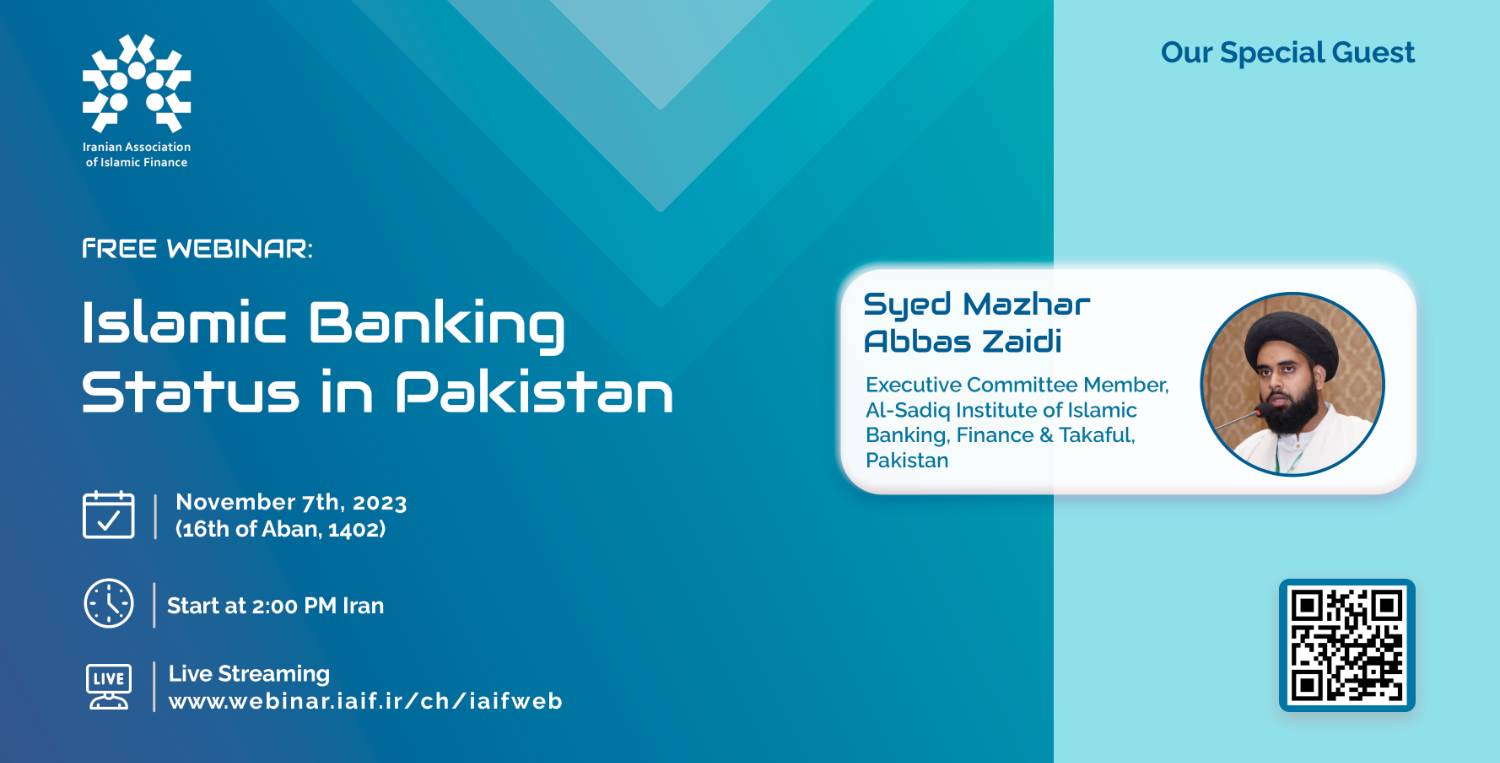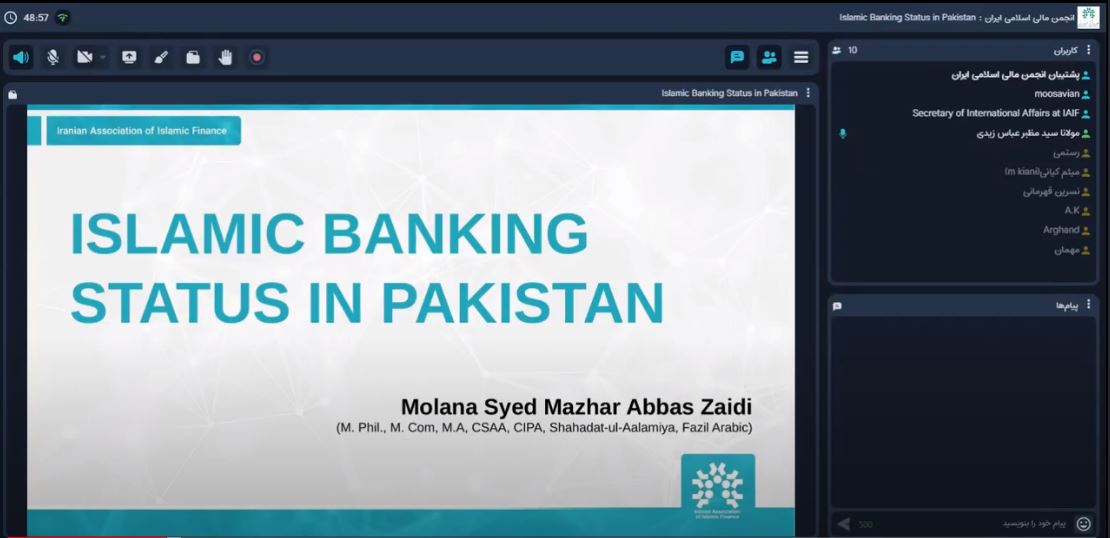

The Iranian Association of Islamic finance held an international webinar on ‘Islamic Banking Status in Pakistan’ on the 7th of November at 2:00 PM Iran time.
Speaker:
Syed Mazhar Abbas Zaidi,
Executive Committee Member, Al-Sadiq Institute of Islamic Banking, Finance and Takaful, Pakistan
In Pakistan, there are two main financial regulators overseeing different sectors of the financial industry:
1. State Bank of Pakistan (SBP):
As the central bank of Pakistan, the State Bank of Pakistan is the main regulator overseeing the country's monetary policy, banking industry, and financial institutions. It regulates and supervises both conventional and Islamic banking operations, formulates monetary policies, and ensures the stability of the financial system.
2. Securities and Exchange Commission of Pakistan (SECP):
The SECP regulates and supervises the corporate sector, securities markets, insurance companies, non-banking financial institutions (NBFIs), and asset management companies in Pakistan. It ensures transparency, investor protection, and the fair functioning of capital markets.
These two key regulatory bodies, the State Bank of Pakistan and the Securities and Exchange Commission of Pakistan, play significant roles in overseeing and regulating different segments of the financial industry, ensuring compliance with regulations and standards in their respective domains.
Subsidiaries of the SBP: The SBP holds “three” fully owned subsidiaries to augment its functions. These are:
• SBP- Banking Services Corporation (SBP-BSC)
Established under the SBP-BSC Ordinance 2001, SBP-BSC supports SBP in performing functions such as handling of currency and credit management, facilitating the inter-bank settlement system, and sale/purchase of savings instruments of the Government on behalf of Central Directorate of National Savings. SBP-BSC also collects revenue and makes payments for and on behalf of the Government. It also carries out operational work relating to development finance, management of public debt, foreign exchange operations and export refinance.
• National Institute of Banking and Finance (NIBAF)
NIBAF is the training arm of SBP, providing executive development trainings to new inductees and various levels of SBP employees. The subsidiary also conducts international courses on central and commercial banking in collaboration with the federal Government. Furthermore, NIBAF offers training to SBP-BSC and other financial institutions.
• Deposit Protection Corporation (DPC)
Deposit Protection Corporation (DPC) has been established as a wholly owned subsidiary of SBP under the DPC Act 2016. Upon commencement, this entity will be responsible to provide protection of deposits of member financial institutions operating in Pakistan. The objective of DPC is to compensate the depositors to the extent of protected deposits in the event of failure of a member Financial Institution.
PRIVATE BANKS
• Askari Bank
• Al Baraka Bank (Pakistan) Limited
• Allied Bank Limited (ABL)
• Bank Alfalah (BAFL)
• Bank Al Habib (BAHL)
• BankIslami Pakistan Limited
• Dubai Islamic Bank Pakistan Limited (DIB Pakistan)
• Faysal Bank (FBL)
• Habib Bank Limited (HBL)
• Habib Metropolitan Bank
• Habib Bank AG Zurich
• JS Bank
• Meezan Bank Limited
• MCB Bank Limited
• Samba Bank (Pakistan) Limited
• Silkbank Limited
• Standard Chartered Pakistan (SC Pakistan)
• Soneri Bank
• Summit Bank
• United Bank Limited (UBL)
PUBLIC SECTOR SCHEDULE BANKS
• National Bank of Pakistan (NBP)
• Bank of Punjab (BOP)
• Sindh Bank
• Bank of Khyber
• First Women Bank
• Zarai Taraqiati Bank Limited
PUBLIC SECTOR NON-SCHEDULE BANKS
Bank of Azad Jammu & Kashmir
FULL - FLEDGED ISLAMIC BANK IN PAKISTAN
1. BankIslami Pakistan
2. Al Baraka Bank Pakistan
3. Dubai Islamic Bank Pakistan
4. Faysal Bank
5. MCB Islamic Bank
6. Meezan Bank
FOREIGN BANKS
• Deutsche Bank AG (Deutsche Bank Pakistan) Germany
• Citi Bank N.A (CitiBank N.A Pakistan) United States
• Industrial and Commercial Bank of China Limited (ICBC Pakistan) China
• Bank of China (Bank of China Pakistan Branch) China
• The Hong Kong and Shanghai Bank (HSBC Bank Pakistan) United Kingdom
• The Bank of Tokyo-Mitsubishi UFJ (MUFG Bank Pakistan) Japan
• Standard Chartered Bank (Standard Chartered Bank Pakistan) United Kingdom
MICROFINANCE BANKS
• Finca Microfinance Bank
• U Microfinance Bank (UPaisa)
• Mobilink Microfinance Bank (JazzCash)
• Khushhali Microfinance Bank
• NRSP Microfinance Bank
• Telenor Microfinance Bank (EasyPaisa)
• NayaPay
• SadaPay
PROGRESS & MARKET SHARE OF ISLAMIC BANKING INDUSTRY – OVERVIEW:
Assets of Islamic Banking Industry (IBI) increased by Rs 327 billion during the quarter October to December 2022, and crossed seven-trillion mark to reach Rs 7,229 billion by end December, 2022. Deposits of IBI also up by Rs 140 billion during the period under review and were recorded at Rs 5,161 billion by end December, 2022. On a year on year (YoY) basis, assets and deposits of IBI observed a noteworthy growth during CY2022. The assets of IBI expanded by Rs 1,652 billion with a YoY growth rate of 29.6 percent. Similarly, deposits of IBI rose by Rs 950 billion marking a YoY growth rate of 22.6 percent. It is important to highlight that this is the maximum ever annual increase in size of assets and deposits of Islamic banking in a particular year.
As a consequence of relentless growth, the market share of Islamic banking assets and deposits in the overall banking industry increased to 20.2 percent and 22 percent, respectively by end December, 2022. The market share of financing of IBI in advances of overall banking industry recorded at 26.3 percent, while the share of investments increased to 16.6 percent by end December, 2022.
BRANCH NETWORK OF ISLAMIC BANKING:
The network of IBI comprised of 22 Islamic Banking Institutions (IBIs), including 5 full-fledged Islamic Banks (IBs) and 17 Conventional Banks having Islamic Banking Branches (IBBs). During the period under review, the branch network of IBI observed a quarterly expansion of 205 branches and increased to 4,396 branches (spread across 129 districts of the country) by end December, 2022. During CY2022, total 440 branches were added to the branch network of IBI.
MODE WISE FINANCING
In terms of mode wise financing, the share of Diminishing Musharaka (34.8 percent) remained highest in the overall financing of IBI, followed by Musharaka (25.2 percent) by end December, 2022.
STRATEGIC PLAN OF ISLAMIC BANKING INDUSTRY BY SBP (2021-25)
This Plan gives headline targets in terms of (i) increasing share in both assets and deposits of Islamic banking industry to 30 percent of overall banking industry, (ii) 35 percent share in branch network of overall banking industry and (iii) 10 percent and 8 percent share of SMEs Financing and Agriculture Financing, respectively in private sector financing of Islamic banking industry.
The Strategic Plan gives a consensus agenda and strategy to take the industry to its next level of growth and development. Along with ensuring conducive legal and regulatory framework, it emphasizes on IBIs to resort to innovative products based on the distinctive Shariah characteristics to cater to unserved sectors, which are critical for growth of the country’s economy. The plan has an extensive focus on improving public perception of Islamic banking as a distinct and viable system capable of catering to the varied financial services needs of various segments of the society. The role of various stakeholders for efficiently achieving objectives under each pillar will be of critical importance in implementation of the strategy. The industry will be required to fully capitalize on potential of Islamic finance for achieving the shared vision of a vibrant and sustainable Islamic banking sector in Pakistan.
Accordingly, the plan signifies following six pillars to focus on to achieve these envisaged targets:
1. Strengthening Legal Landscape
2. Enhancing Conduciveness of Regulatory Framework
3. Reinforcing Comprehensive Shariah Governance Framework
4. Improving Liquidity Management Framework
5. Expanding Outreach & Market Development
6. Bolstering Human Capital & Raising Awareness


